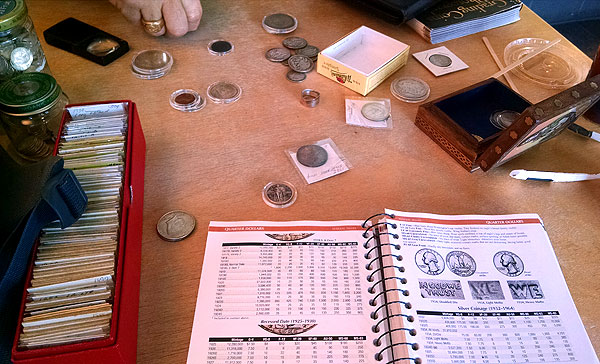A 5 Step Guide to Coin Collecting

[Hey guys! Have a great article to share today for all those new – or interested in – starting a coin collection. I didn’t know what the hell I was doing starting out, so hopefully this gives y’all a better start :) And it comes from the staff over at Coin World too – one of my favorite magazines!]
While once called the hobby of kings, collecting coins still appeals to many political leaders, captains of industry and celebrities. Yet today, even children and people with very modest resources can still enjoy putting together sets of collectible coins.
According to the U.S. Mint, coin collecting gained traction with the general public in the United States during the 1930s, in the heart of the Great Depression. Interest grew because companies began printing affordable coin folders for a variety of coins that could still be found in circulation at that time and commemorative coins became both popular and available.
Becoming a Coin Collector in Five Simple Steps
At first, this hobby might seem a bit overwhelming, but these five steps should have you calling yourself a coin collector in no time:
#1. Learn the Lingo
Most hobbies have their own language. Coin collecting is no different. For example, a coin grade of “Fine” or “Very Fine” designate circulated coins that can appear pretty rough when compared to a coin in “Mint State.” Always a good resource, the U.S. Mint publishes a glossary of common coin terms that will help novice collectors understand other educational materials, news and coin descriptions.
#2. Decide On a Niche
Different societies have produced their own coins for thousands of years, so novices will probably have more success by beginning in one niche. The right focus really depends on the collector’s interest, budget and primary reason for hoping to start a coin collection. Keep in mind that you can always change your mind or expand your focus as you gain more knowledge about collecting.
These are some examples to help you choose a niche:
- Collectors who hope to regard their coins as an investment or safe harbor might want to consider bullion coins.
- Collectors who have limited resources but enjoy a treasure hunt might want to consider collectible U.S. coins that have been in circulation and might still be uncovered in change or bank rolls.
- Collectors with a particular interest in a certain historical period might want to choose coins from that time period because the politics, economy and even art of a certain time usually impacts the coins that were struck.
- [Editor’s Note: I tend to collect those older U.S. coins from the 1800’s, and especially the “weird” denominations like the half cents, two cents, three cents, half dime (not to be confused with a nickel), etc. And then of course there’s the interesting foreign coins :)]
#3. Get Prepared and Organized
Once you have decided on your initial focus, you might invest in a few supplies to deepen your knowledge and keep your collection organized and protected. For example, you might research some good books or online resources that are dedicated to your own particular niche. Albums, protective coin holders and display cases might also help. Also, collectors seldom regret investing in a decent magnifying glass or jeweler’s loupe.
#4. Make Collecting Social
Coin collecting clubs have been organized in almost every community and having access to other collectors and even some experts can really help broaden knowledge and spark inspiration about your hobby. If you don’t care to join a local club, you can also find countless online communities and forums. Interacting with other collectors can also be critical for novices because more experienced collectors can help direct new members to good resources and help them avoid making bad decisions.
[Editor’s note: Joining a local coin club was by far the best thing I’ve done for my collection. Not only do you get to learn a lot, but it’s FUN and you can *trade* too!]
#5. Keep Expanding Your Knowledge and Collection
Keep hunting for coins. Of course, your own methods of expanding your collection might depend on your focus and budget. While some collectors still search pocket change or rolls of coins from the bank, others mostly obtain new pieces at online or local coin auctions, from online or local coin dealers, from the issuing mints, or through private transactions. Most collectors use a few different methods of obtaining coins that work for them. As new collectors research potential purchases, this will naturally increase their knowledge.
Make Collecting Coins a Lifelong Hobby
In time, collectors find that numismatics, or the study of coins and related objects, is an educational, exciting and possibly profitable hobby — even collectors who are regarded as experts always keep learning. The great aspect about collecting coins is that there is enough to learn to fill several lifetimes.
******
Joe O’Donnell, digital content producer, joined the Coin World editorial staff in 2014. Joe writes web content, manages Coin World’s social media accounts, compiles content for daily digital eNewsletters, and contributes on occasion to the print magazine. He has enjoyed interacting with Coin World readers while covering the sale of coins from the Saddle Ridge Hoard and the 50th anniversary Kennedy half dollar releases.
PS: That picture above was me and a coin club member trading coins at Starbucks :) Is there anything better than coffee and coins??




